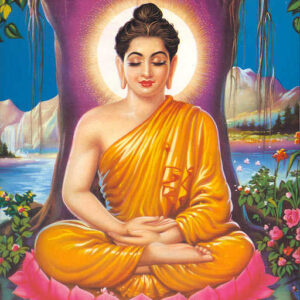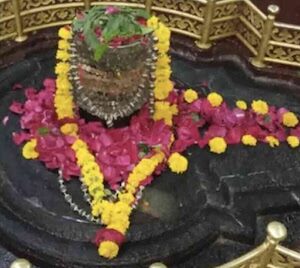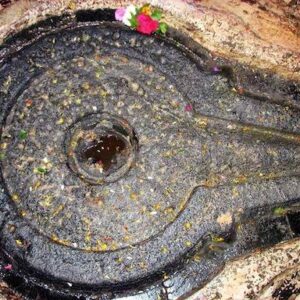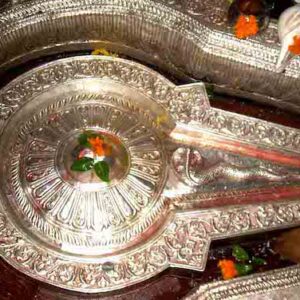This is a Sanjivan Samadhi of Raja Bhatriharinath. He is also known as Vicharnath.
There is space to sit and meditate. You can go into meditative states effortlessly here.
How to get there
The temple is located 17 kms North East of Parli Vaijnath.
Map: https://maps.app.goo.gl/86KkBrwXwTPX1zwA9
About Raja Bhatriharinath
The name of Raja Bhartrihari (or Bhartri) is widely known in India as the name of the king who has renounced his throne to become an ascetic. The dramatic story of his renunciation traditionally was one of the favorite themes of the ballads sung by the wandering minstrels and performed by the folk theaters all over India.
Before his renunciation, he was the king of the Malva Kingdom, with its capital in Avantika (modern Ujjain). He had a younger brother Vikramaditya (Chandragupta second), who ruled after he renounced his throne from 1076 till 1126.
Following some legends circulating amongst Nathas, Raja Bhartrihari was also the brother of Queen Menavati, the mother of another legendary personage of the Natha tradition, Raja Gopichand. Raja Bhartrihari had many wives, but his favorite and most famous wife was Rani (queen) Pingala.
The king was a highly educated person who has written several books in Sanskrit, which are counted as masterpieces of Indian literature. The three most famous are Vairagya Shataka, Niti Shataka, and Shringara Shataka; when combined into one volume, they are called Shatakatraya. Some researchers believe that the work on grammar Vakyapadiya is one more of his books. There are also a few compositions in old Indian dialects ascribed to his authorship.
Legend
Many versions of Bhartriharis’s life story exist, circulating in different formats (as songs, theatrical plays, and books) all over India. However, all of them are based on the two main variants of the story describing the reasons for Bhartrihari’s renunciation; first of them directly connecting it with the influence of the Guru Gorakshanath, while the other two variations, although basically same, differ from each other by sometimes mentioning and sometimes omitting any relations existing between both personalities. The first version, which circulates amongst Nathas and in the form of folk ballads sung by wandering minstrels, can be divided into two parts: one, when Gorakshanath has met Bhartrihari in the jungle, and a second one when he meets him after Bhartrihari’s wife Pingala, has died, and the king was mourning her.
The First Version (Natha) Part One
Gorakshanath was performing his sadhana on the top of Toranmal mountain. At the same time, Raja Bartrihari went to the same area of the jungle to hunt. He killed a male deer near where the yogi was sitting, and Gorakshanath saw what happened. A female deer accompanied the male deer killed by the king, and when Raja wanted to carry off his hunt and tie it to his horse, she was sorrowfully watching from some distance.
The yogi rebuked Raja for what was done by him and told him that he had no right to kill a deer because he is unable to make him alive. On hearing this, the annoyed Raja started arguing with the yogi, after which Gorakshanath revived the deer, which ran away into the jungle.
Raja Bhartrihari was so impressed by the development of events that he expressed his desire to renounce the world and asked the yogi to make him his disciple. Gorakshanath answered that before that, he should go to the palace and ask his wife’s permission to do it. After this, they separated and went their way. Gorakshanath returned to the top of the mountain, while Raja Bhartrihari went to his capital.
Part Two
Bhartrihari was the Raja of the Malwa kingdom with its capital in Ujjain. He was a wise and mighty king who ruled over broad areas, having total authority. It is said that he had as many as one thousand wives. But the one whom he loved most of all was queen Pingala.
Once, the king overheard her saying to one of her attendant women that she loved the king so much that she could not survive his death even for a moment. So he decided to examine how strong her love is, and once, when he went hunting in the jungle, he sent a messenger to the palace with the announcement that a tiger killed him. The messenger brought the king’s clothes drenched in the blood of a recently killed antelope, which he showed to the queen to prove that his words were true. After getting this news, the queen immediately swallowed poison and died. When the king later returned to the palace and found out what had happened, he greatly regretted the mistake and felt totally responsible. He became so overwhelmed with grief that he could not do anything, and all-time was sitting at the cremation ground, mourning the queen’s death. On seeing his suffering, many of his people also became filled with sorrow and joined him in his mourning.
When he was sitting there, he whined, ‘Hey Pingala, hey Pingala, hey Pingala.’
Gorakshanath came near, dropped his earthen pot, and started crying even louder than the king: ‘Hey my earthen pot, hey my earthen pot.‘
When the king, filled with sorrow, noticed him and asked about the reasons for his grief, Gorakshanath told him that he was moaning about his begging bowl.
After the yogi told him about the reasons for his sorrow, the King became greatly ashamed, seeing that all that the yogi was so loudly weeping about was the earthen pot he broke. So he told him: ‘Don’t cry for your earthen pot, and make me sadder, I will give you a hundred new pots better than yours, but please stop crying.‘
However, the yogi didn’t stop and answered with abundant tears dropping from his eyes: ‘No, I don’t want your pots, I want only my old one, which I loved so much.‘ The king replied: ‘What nonsense! Isn’t it impossible to return what has been destroyed?‘ At this, Gorakshanath ceased crying and told him: ‘O wise king! If you know this, then why are you crying here for your Queen, who also has gone forever? Will your crying return her? You have so many more queens, then why do you cry about this one?‘
The king answered that it is not possible to compare love for a queen with love for an earthen pot. Gorakshanath replied, saying that there isn’t much difference between both, be it earthen pot or body of man, because both are made from earth, and what has come from earth one day must return to it. That is the law of nature.
But in the end, he added: ‘Would you be able to recognise your queen who seems so special to you if I were to restore her by my yogic powers?‘ ‘Yes, of course,’ the king said. After that, Gorakshanath created by his yogic power one hundred queens, each of whom was an exact copy of queen Pingala. ‘Now pick out the one that is yours’, he told the ashamed king.
After the king was unable to choose, he renounced his kingdom and became a disciple of Guru Gorakshanath.
Read More:
https://mydattatreya.com/bharatarinath/







